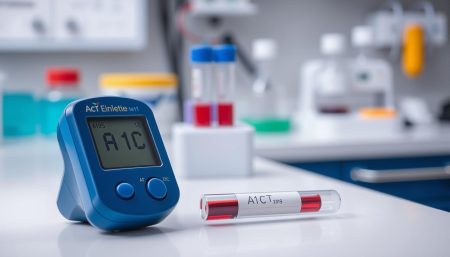The world of medical coding is always changing. When it comes to diabetes mellitus ICD 10 classification, being precise is essential. Diabetes affects millions globally, and healthcare professionals use accurate coding for diagnosis, treatment, and billing.
This guide is a must-have for coding experts. It offers a deep dive into the diabetes mellitus diagnosis code.
As medicine grows, so does the complexity of diseases like diabetes mellitus. It’s a complex disease with various types and complications. The ICD 10 system helps categorize these to improve healthcare.
Those who code for diabetes mellitus need to be skilled. They must ensure each patient’s medical story is told accurately.
The guide covers the complexities of diabetes mellitus and its effects on patients. It’s vital for clinicians and coders to understand. They will learn how to document better, improve patient care, and work more efficiently.
Understanding ICD 10 and Its Importance in Healthcare
The International Classification of Diseases, Tenth Revision (ICD 10) system has changed healthcare. It offers a detailed catalog for many health issues and new healthcare needs. This system makes healthcare services more precise worldwide, including for diabetes mellitus.
What Is the ICD 10 System?
The ICD 10 system is a key tool in today’s healthcare. It helps record a wide range of health conditions efficiently. Doctors use it to classify and code diagnoses, symptoms, and procedures in patient records.
This system allows for tracking and analyzing health trends. It helps understand the health of populations better.
Why Is ICD 10 Crucial for Diabetes Mellitus Documentation?
For diabetes mellitus, accurate ICD 10 coding is essential. It helps monitor the patient’s health, plan treatments, and get insurance payments. The ICD 10 system also improves data for healthcare providers.
It helps track diabetes progress, check treatment success, and predict outcomes. This makes healthcare more effective.
Exploring the Basics of Diabetes Mellitus
Diabetes Mellitus is a group of diseases that cause high blood sugar levels. This happens because of problems with insulin, either not making enough or not using it right. Knowing the basics is key for correct ICD 10 coding and managing the disease well.
Types of Diabetes Mellitus
There are many types of diabetes mellitus, each with its own cause and symptoms:
- Type 1 Diabetes Mellitus: Usually found in kids and young adults, where the body can’t make insulin.
- Type 2 Diabetes Mellitus: The most common, where the body doesn’t use insulin well or makes too little.
- Gestational Diabetes: Happens during pregnancy and usually goes away after, but raises the risk of Type 2 later.
- Other Specific Types: Includes monogenic diabetes syndromes, like maturity-onset diabetes of the young (MODY), and diseases of the exocrine pancreas.
Each type needs a different approach for diagnosis and treatment. This is shown in their specific diabetes type 2 icd 10 code and other classifications.
Risks and Symptoms of Diabetes Mellitus
Knowing the risks and symptoms is key for early detection and treatment. Here are some important points:
- Risk Factors: Include family history, genetics, age, and lifestyle factors like bad diet and not moving enough.
- Common Symptoms: Signs like too much thirst, needing to pee a lot, feeling very tired, and losing weight without trying should be noticed.
Spotting these symptoms early helps get a correct diagnosis. It also helps use the right diabetes type 2 icd 10 code. This ensures the best treatment and management plans are followed.
Diabetes Mellitus ICD 10 Classification
The diabetes mellitus classification system under ICD 10 is detailed. It covers different types and complications of diabetes. This system is key for accurate coding and treatment.
Each diabetes type has its own code. These codes are vital for patient care. They include Type 1, Type 2, and gestational diabetes, among others.
Each complication, like neuropathy, retinopathy, and nephropathy, is detailed. Each has its own diabetes mellitus diagnosis code.
| Type | Code | Complications |
|---|---|---|
| Type 1 Diabetes Mellitus | E10 | Neuropathy, Nephropathy, Retinopathy |
| Type 2 Diabetes Mellitus | E11 | Neuropathy, Nephropathy, Retinopathy |
| Gestational Diabetes | O24 | Gestational Complications |
This system helps with coding and billing. It’s also vital for diabetes research. The right use of diabetes mellitus classification and diabetes mellitus diagnosis code helps the healthcare system manage and study diabetes.
Coding Guidelines for Diabetes Mellitus in ICD 10
Learning the diabetes coding guidelines in ICD 10 is key for healthcare pros. It ensures accurate and compliant coding. Accurate coding is vital for patient care and billing.
We’ll look at the rules for coding diabetes and how to handle complications.
General Rules for Diabetes Coding
Diabetes coding in ICD 10 needs careful attention. It depends on the type of diabetes, like Type 1 or Type 2. Coders must check the ICD 10 code for non insulin dependent diabetes for Type 2.
It’s important to be specific. ICD 10 codes vary based on insulin use and diabetes control.
How to Accurately Code Complications
When coding diabetes complications, coders must know if they’re diabetes-related. This includes kidney disease, retinopathy, or heart issues from diabetes. Each complication has its own codes.
Knowing and using these diabetes coding guidelines is important. It helps create detailed medical records. This improves clinical decisions and opens up better healthcare options.
Proper coding is essential for managing diabetes care. It helps healthcare providers offer a full range of care.
ICD 10 Code for Type 1 Diabetes Mellitus
Type 1 diabetes, which needs insulin, has specific ICD codes for accurate diagnosis and treatment. It’s caused by the body attacking its own insulin-making cells. This makes it important to document it correctly to tell it apart from other diabetes types.
Specific Codes for Type 1 Diabetes with Complications
The main ICD 10 code for insulin-dependent diabetes mellitus is E10. But, there are more codes for complications. Each complication gets its own sub-code to help with billing and patient care. Here’s a list of these complications and their codes:
| Complication | ICD 10 Code |
|---|---|
| Ketoacidosis | E10.10 |
| With kidney complications | E10.21 |
| With ophthalmic complications | E10.39 |
| With neurological complications | E10.40 |
Documentation Tips for Type 1 Diabetes Mellitus
It’s key to document type 1 diabetes and its complications well in medical records. Healthcare workers should note any complications or other health issues at each visit. This helps with ongoing care and accurate coding.
Recording every detail is important. It affects the ICD 10 code for insulin-dependent diabetes mellitus. This, in turn, impacts treatment and how much insurance pays.
ICD 10 Code for Type 2 Diabetes Mellitus
Type 2 Diabetes Mellitus is a common form of diabetes, known by the diabetes type 2 icd 10 code E11. It’s different from Type 1 because it’s linked more to lifestyle and appears in adults. This makes it a non insulin dependent diabetes icd 10 condition. Knowing the difference between Type 2 and Type 1 diabetes codes is key for proper medical care and treatment.
Distinguishing Between Type 2 and Type 1 Diabetes Codes
It’s important to correctly identify Type 2 diabetes with the diabetes type 2 icd 10 code. This is not just for treatment but also for insurance and health studies. Using the non insulin dependent diabetes icd 10 code correctly also impacts patient care and health results.
| Type | ICD 10 Code | Dependency on Insulin | Typical Onset |
|---|---|---|---|
| Type 1 Diabetes Mellitus | E10 | Insulin Dependent | Childhood/Young Adult |
| Type 2 Diabetes Mellitus | E11 | Non Insulin Dependent | Adult |
Navigating Diabetes Mellitus Diagnosis Code Selection
Choosing the right diagnosis code selection for diabetes mellitus is very important. The correct icd 10 code for diabetes mellitus helps with patient records, claims, and care planning. It’s essential to understand the different types of diabetes to pick the right code.
When picking a diabetes mellitus icd 10 code, consider the diabetes type, any complications, and insulin use. This information helps doctors plan the best treatment and care for each patient.
| Type of Diabetes | ICD 10 Code | Notes |
|---|---|---|
| Type 1 Diabetes Mellitus | E10 | No insulin use specified |
| Type 2 Diabetes Mellitus | E11 | Includes cases managed by diet, oral medications, or insulin |
| Gestational Diabetes | O24.4 | Diagnosed during pregnancy |
| Diabetes with Renal Complications | E11.22 | Type 2 diabetes with kidney complications |
| Diabetes with Ophthalmic Complications | E10.39 | Type 1 diabetes with severe eye complications |
Choosing the right icd 10 code for diabetes mellitus affects many areas of healthcare. It’s important to be careful and knowledgeable when picking codes. This ensures each patient gets the right care based on their diabetes type.
Common Challenges in Coding for Diabetes Mellitus
Accurately coding for diabetes mellitus is complex. It requires careful management to avoid frequent errors. Healthcare professionals face challenges due to the varied symptoms and treatments of diabetes.
How to Avoid Common Mistakes
Misclassifying diabetes types or complications is a common mistake. To avoid this, continuous training and updates with coding manuals are key. Automated coding tools can also help reduce errors.
Case Studies: Real-world Coding Examples
Case studies show common challenges and how to fix them. They provide practical insights for both new and experienced coders. These examples are invaluable for accurate coding practices.
| Case Study | Error Identified | Corrective Action |
|---|---|---|
| Type 2 Diabetes Improperly Coded as Type 1 | Misclassification due to symptom overlap | Review of patient’s medical history and consultation notes for accurate classification |
| Complication Coded as Diabetes-Related when It Wasn’t | Assumption without proper investigation | Cross-reference with clinical documentation to confirm complications are diabetes-related |
| Omission of Coding Diabetes Severity | Lack of details leading to unspecified diabetes code usage | Utilize specific codes from latest ICD-10 updates post thorough evaluation |
ICD 10 Code for Insulin Dependent Diabetes Mellitus
It’s key to code icd 10 code for insulin dependent diabetes mellitus right for patient care and insurance. This code is important for noting when patients need insulin to manage their diabetes. It’s different from other diabetes types that might not need insulin.
Knowing about insulin dependence coding helps doctors track diabetes progress and treatment success. It’s important to note if insulin use is because of beta-cell failure or worsening condition.
Clarifying Insulin Dependence in ICD 10 Coding
For coding pros, using the right icd 10 code for insulin dependent diabetes mellitus is critical. The right code affects treatment and insurance payments. It’s vital to show insulin use is medically necessary to manage diabetes well.
Good coding is key for accurate diagnosis and treatment, as health guidelines suggest. Also, knowing if insulin is needed short-term or long-term affects the code and care plans.
ICD 10 Code for Non Insulin Dependent Diabetes
Accurate coding of diabetes in medical records is key. It helps in treatment and health insurance. The icd 10 code for non insulin dependent diabetes is vital for those not needing daily insulin. It ensures treatment is tailored and covered.
It’s important to know the differences between diabetes types. Accurate non insulin dependent coding helps monitor patients better. It also helps the healthcare system support them properly.
| Main Category | Code | Description |
|---|---|---|
| Non Insulin Dependent Diabetes | E11 | Type 2 diabetes mellitus without complications |
| Non Insulin Dependent Diabetes | E11.22 | Type 2 diabetes mellitus with diabetic chronic kidney disease |
| Non Insulin Dependent Coding Necessity | E11.65 | Type 2 diabetes mellitus with hyperglycemia |
Accurate ICD-10 coding is more than just treatment. It helps track non-insulin dependent diabetes. This is key for health systems planning and resource use.
ICD 10 Diabetes Unspecified: How to Handle Ambiguous Cases
When healthcare professionals face unclear diabetes types, the icd 10 diabetes unspecified code is key. It’s about understanding and using ambiguous diabetes coding wisely. This ensures patients get the right care, even when details are fuzzy.
Best Practices for Unspecified Diabetes Coding
Accurate diabetes coding, even with unclear cases, follows certain steps. The main aim is to get as specific a diagnosis as possible. But sometimes, starting with an unspecified diabetes code is necessary.
- Collect as much clinical data as you can to pinpoint a specific diagnosis.
- Talk to other healthcare teams to ensure all info is correct and complete.
- Keep reviewing and updating the diagnosis as new data comes in.
- Follow unspecified diabetes best practices for documentation to prevent care and billing problems.
Handling icd 10 diabetes unspecified cases needs careful and informed coding. Here’s a detailed table with key points for managing unclear diabetes coding:
| Aspect | Best Practice | Rationale |
|---|---|---|
| Initial Assessment | Use E14 code but seek more information. | Ensures treatment can start while seeking clarity. |
| Documentation | Maintain detailed notes on symptoms and tests conducted. | Helps in refining diagnosis over time. |
| Follow-up | Schedule regular reviews of the patient’s condition. | Facilitates early detection of specific diabetes type. |
Effective Use of ICD 10 Codes in Diabetes Management
Managing type 2 diabetes gets better with the diabetes type 2 icd 10 code. This code makes tracking and treatment more accurate. So, accurate ICD 10 coding is key for good diabetes management.
Impact of Accurate Coding on Patient Care
ICD 10 codes help make patient care better. They let doctors create care plans that fit each patient’s needs. This way, patients get the right treatment.
Also, accurate coding helps track how patients are doing. This makes it easier to change treatment plans if needed.
ICD 10 and Diabetes Monitoring and Follow-Up
Following up with patients is important for diabetes care. ICD 10 codes help a lot here. They help doctors keep detailed records of patient care.
This makes sure everyone involved in a patient’s care knows what’s going on. It helps everyone work together better.
Here’s a table showing why accurate ICD 10 coding is good for type 2 diabetes:
| ICD 10 Coding Benefit | Description |
|---|---|
| Precise Treatment Plans | Enables personalized care plans based on specific diabetes type 2 conditions. |
| Improved Monitoring | Facilitates regular health assessments to adjust treatments as necessary. |
| Enhanced Communication | Streamlines information sharing across multiple providers, ensuring unified patient care strategy. |
| Better Patient Outcomes | Promotes improved health results through meticulous management and follow-up protocols. |

ICD 10 and Diabetes Mellitus: Billing and Insurance Implications
ICD 10 billing needs to be very accurate for insurance to work smoothly. Using the right diabetes mellitus diagnosis codes is key. It helps healthcare providers get paid right and avoid financial problems.
Navigating Reimbursements with Accurate ICD 10 Codes
The move to ICD 10 has changed billing for healthcare places. Every diabetes code must match the treatment given. This avoids delays in getting paid by insurance.
| Diabetes Mellitus Type | ICD 10 Code | Common Billing Issues | Insurance Claim Outcome |
|---|---|---|---|
| Type 1 Diabetes Mellitus | E10 | Incomplete coding of complications | Increased claim denials |
| Type 2 Diabetes Mellitus | E11 | Failure to specify controlled or uncontrolled status | Delayed reimbursements |
| Gestational Diabetes | O24 | Omission of trimester specification | Claim rejections |
| Other Types of Diabetes | E13 | Lack of detailed documentation | Additional documentation requests |
Errors in ICD 10 billing can cost a lot of time and money. It’s important for healthcare staff to keep learning about diabetes coding. This helps get the best insurance results and keeps practices financially healthy.
Keeping Up-to-Date with ICD 10 Code Changes for Diabetes Mellitus
Healthcare is always changing, and those who manage diabetes mellitus must keep up with ICD 10 code updates. These changes help with accurate medical records, billing, and patient care. The diabetes mellitus icd 10 codes show the newest medical knowledge and treatments.
It’s important to regularly check the ICD 10 code changes. This is not just about following rules. It also helps improve diabetes care quality.
With new treatments and a better understanding of diabetes, it’s vital to stay current with ICD 10 updates. This lets healthcare providers accurately record a patient’s health and care. Changes to ICD 10 codes reflect the latest in diabetes care.
Keeping up with these changes helps maintain consistent patient records. This is key for ongoing care and research.
It’s important to invest in ongoing education and reliable resources for ICD 10 updates. Organizations should train their coding staff and update systems quickly. This effort leads to better patient care, smoother operations, and more accurate payments.
Healthcare professionals must understand ICD 10 code changes. This commitment to quality care and effective communication is essential.
FAQ
Q: What is the ICD 10 system?
A: The ICD 10 system is a global standard for classifying health conditions. It helps healthcare professionals worldwide. They use it for diagnosis, insurance billing, and health statistics.
Q: Why is precise documentation with ICD 10 important for diabetes management?
A: Precise documentation with ICD 10 is key for diabetes management. It ensures accurate records and proper care. It also helps track the patient’s condition and treatment plans.
Q: What are the different types of diabetes mellitus?
A: There are several types of diabetes mellitus. Type 1 is insulin-dependent. Type 2 often starts with insulin resistance. Gestational diabetes occurs during pregnancy. There are also other specific types.
Q: How is diabetes mellitus classified in ICD 10?
A: ICD 10 classifies diabetes mellitus by type and body system affected. It also considers complications. Each category has specific codes for accurate descriptions.
Q: What are the general rules for coding diabetes mellitus in ICD 10?
A: For coding diabetes mellitus, use the highest level of specificity. Identify the diabetes type and any complications or associated conditions.
Q: How should complications related to diabetes mellitus be coded in ICD 10?
A: Complications should be coded with additional details. This includes the specific complication type and its relation to diabetes mellitus.
Q: What is the ICD 10 code for insulin-dependent diabetes mellitus?
A: The ICD 10 code for insulin-dependent diabetes mellitus is E10. Additional digits describe any complications or manifestations.
Q: How do I differentiate between type 2 and type 1 diabetes mellitus in ICD 10?
A: Type 2 diabetes mellitus is coded as E11 in ICD 10. Type 1 is coded as E10. Accurate coding is important for treatment and insurance claims.
Q: What should I do if the type of diabetes mellitus is unspecified?
A: If the type is unspecified, use ICD 10 code E14. But, try to gather more clinical information for a precise code.
Q: Why is accurate ICD 10 coding impactful on diabetes management?
A: Accurate ICD 10 coding ensures proper care and monitoring. It improves communication among healthcare providers and insurers.
Q: How do ICD 10 codes for diabetes mellitus affect billing and insurance?
A: ICD 10 codes affect billing and insurance by determining reimbursement. Proper coding prevents claim denials and ensures timely payments.
Q: How can healthcare professionals stay updated with ICD 10 code changes for diabetes mellitus?
A: Healthcare professionals can stay updated by attending training sessions and subscribing to coding updates. They should also reference the latest manuals and participate in workshops and webinars.


















